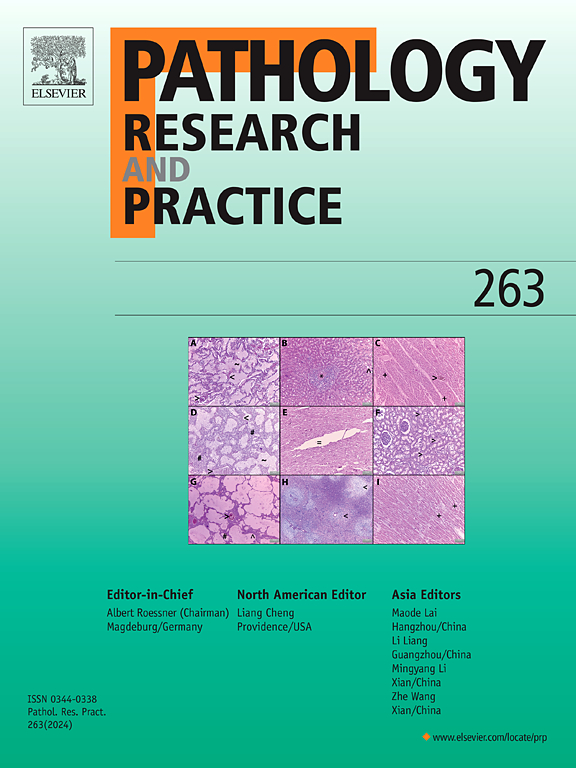Molecular findings in endometrial mucinous carcinoma of the gastric [Gastrointestinal] type: A report of 5 additional cases and a systematic review of the literature
IF 2.9
4区 医学
Q2 PATHOLOGY
引用次数: 0
Abstract
The authors summarize the somatic mutational landscape of endometrial mucinous carcinoma of the gastric (gastrointestinal) type [MCG], based on findings from a 5-case cohort and a systematic review of the literature, the latter including 25 cases from 3 published reports. The 30 cases were analyzed by variably-sized next generation sequencing gene panels, and featured 74 total mutations, including 20 unique mutations [mean 2.47 ± 1.14 mutations/case; median= 2; range 1–5]. Mutations that were identified in > 1 case included TP53 (20/30, 66.7 %), KRAS (11/30, 36.7 %), PIK3CA (9/30, 30 %), BRCA2 (4/30, 13.3 %), STK11 (4/30, 13.3 %), ERBB2 (3/30, 10 %), SMAD4 (3/30, 10 %), FBXW7 (3/30, 10 %), ATM (3/30, 10 %), PTEN (2/30, 6.7 %), ARID1A (2/30, 6.7 %), and CDKN2A (2/30, 6.7 %). The most commonly reported combination of mutations [irrespective of the concurrent presence of other mutations] included KRAS + TP53 (9/30, 30.0 %), PIK3CA + TP53 (4/30, 13.3 %), SMAD4 + TP53 (3/30, 10 %), STK11 + TP53 (3/30, 10 %). Regarding molecular classification, most cases (20/30, 66.7 %) were p53-abnormal, with smaller subsets being dMMR (10 %), of “no specific molecular profile” (6/30, 20 %), and POLE mutated (1/30, 3.3 %). In summary, MCG may display a spectrum of mutations of potential clinicopathologic significance. TP53, KRAS and PIK3CA are the most commonly mutated genes in MCG. The four molecular subclasses of endometrial carcinoma are represented in MCG, with p53-abnormal being predominant. Our findings highlight the molecular landscape of this rare and incompletely characterized entity.
胃[胃肠道]型子宫内膜黏液癌的分子表现:附5例报告及文献系统复习
作者总结了胃(胃肠)型子宫内膜黏液癌[MCG]的体细胞突变景观,基于5例队列研究和文献系统综述,后者包括来自3篇已发表报告的25例。通过可变大小的下一代测序基因面板对30例进行分析,共发现74个突变,其中20个为独特突变[平均2.47 ± 1.14个突变/例;值= 2;范围1 - 5]。突变被发现在祝辞 1例包括TP53(20/30, 66.7 %),喀斯特(11/30,36.7 %),PIK3CA(9/30, 30 %),BRCA2(4/30, 13.3 %),STK11(4/30, 13.3 %),ERBB2(3/30, 10 %),SMAD4(3/30, 10 %),FBXW7(3/30, 10 %),ATM(3/30, 10 %),PTEN(2/30, 6.7 %),ARID1A(2/30, 6.7 %),和CDKN2A(2/30, 6.7 %)。最常报道的组合突变(无论并发其他突变的存在)包括喀斯特+ TP53(9/30, 30.0 %),PIK3CA + TP53(4/30, 13.3 %),SMAD4 + TP53(3/30, 10 %),STK11 + TP53(3/30, 10 %)。在分子分类方面,大多数病例为p53异常(20/30,66.7 %),较小的亚群为dMMR(10 %),“无特定分子谱”(6/30,20 %)和POLE突变(1/30,3.3 %)。总之,MCG可能表现出一系列具有潜在临床病理意义的突变。TP53、KRAS和PIK3CA是MCG中最常见的突变基因。子宫内膜癌的四个分子亚类在MCG中均有表现,以p53异常为主。我们的发现突出了这种罕见的和不完全表征实体的分子景观。
本文章由计算机程序翻译,如有差异,请以英文原文为准。
求助全文
约1分钟内获得全文
求助全文
来源期刊
CiteScore
5.00
自引率
3.60%
发文量
405
审稿时长
24 days
期刊介绍:
Pathology, Research and Practice provides accessible coverage of the most recent developments across the entire field of pathology: Reviews focus on recent progress in pathology, while Comments look at interesting current problems and at hypotheses for future developments in pathology. Original Papers present novel findings on all aspects of general, anatomic and molecular pathology. Rapid Communications inform readers on preliminary findings that may be relevant for further studies and need to be communicated quickly. Teaching Cases look at new aspects or special diagnostic problems of diseases and at case reports relevant for the pathologist''s practice.

 求助内容:
求助内容: 应助结果提醒方式:
应助结果提醒方式:


